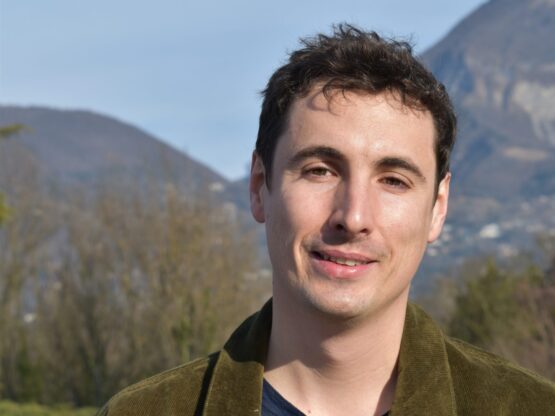Romain, please introduce yourself.
I am Romain Millan, a post-doc working at the Institut des Géosciences de l'Environnement in Grenoble. I am a specialist in the use of satellite and airborne remote sensing data at large scale.
Tell us about your professional and academic career before becoming part of the OCEAN:ICE community.
I did my PhD in the Earth System Science department at the University of California, Irvine, under the supervision of Prof. Eric Rignot. My thesis was about developing inversion methods that use multiple remote sensing observations, to provide new map of the bedrock at the front of glaciers, below ice shelves or under Patagonian ice fields. After finishing my PhD in 2018, I received a grant from the French space agency to study the dynamic of mountain glaciers. I worked at the IGE laboratory in Grenoble, with Jeremie Mouginot and Antoine Rabatel, where I developed a unique processing chain that is able to calculate surface flow velocities at regional scale using both optical and radar data. We scaled this pipeline to the entire world and provided the first atlas of glacier dynamics at high-resolution. We used this new dataset to provide an updated estimation of ice thickness distribution around the world, which revealed major changes compared to previous approaches. After this, I worked at the University of Copenhagen, with Dr. Anders Bjørk, where I studied changes in the last remaining ice shelves of North Greenland. Using a large amount of satellite data, we were lucky to witness unique events with widespread grounding line retreat and increase in basal melting rates.
What do you do within OCEAN:ICE?
I joined the project in the beginning of January 2023. I am part of WP3 where I am interested in providing the most spatially and temporally resolved state-of-the-art satellite observations of freshwater fluxes resulting from basal melting and calving of ice shelves around Antarctica. I am also the Early Career Researchers representative until September this year. I organize monthly meetings among ECRs to discuss ongoing events within OCEAN:ICE and where ECRs are also presenting their ongoing work.
What have you enjoyed about OCEAN:ICE so far?
What I enjoyed most about this project was being in constant contact with the ocean modelers and being able to discuss their needs in detail. This helped me understand how to bridge the gap between modeling and remote sensing, which is more my research interest. I also really enjoyed meeting the different ECRs from other WPs. Through the few seminars we organized, I was able to discover new disciplines in the study of the ocean around Antarctica. That is really exciting.
Tell us about a skill or trait unique to you that you would like to share?
That is not something unique, but I am always up for going to have a beer with friends and colleagues!
Stay tuned on our social media channels (Twitter, Mastodon, LinkedIn and Facebook) for more, as this is just the beginning of the series of OCEAN:ICE 'Researcher in the Spotlight' articles.


